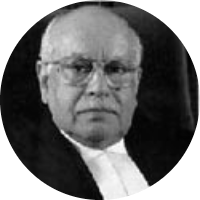A.S. Anand

A.S. Anand
Former Chief Justice of India
Assumed Office10th Oct, 1998
Retired On31st Oct, 2001
Previously
Chief Justice of Madras High CourtNovember 1st 1989 - November 18th 1991
Chief Justice of Jammu & Kashmir High CourtMay 11th 1985 - October 31st 1989
Acting Chief Justice of Jammu & Kashmir High Court May 26th 1984 - May 10th 1985
Permanent Judge of Jammu & Kashmir High Court February 1976 - May 25th 1984
Additional Judge of Jammu & Kashmir High Court May 26th 1975 - February 1976
EnrollmentNovember 9th 1964
Education
Degree of Doctor of Letters (Honoris Causa)Jammu University
Fellowship of the University College, LondonUniversity College, London
Degree of LL.D. (Honoris Causa) Lucknow University
Degree of Doctor of Philosophy in Laws (Constitutional Law of the Commonwealth) London University
Diploma in Labour Laws 1960 Lucknow University
L.L.B.Lucknow University
GraduationJammu and Kashmir University
Profile
Born on November 1st 1936, Justice Adarsh Sein Anand, was enrolled as an advocate on November 9th 1964. He mainly practised in the Punjab and Harayana High Court. He held various positions in academia and was affiliated with several educational institutions including Punjab University and Jammu University. He also authored a book titled “The Constitution of Jammu & Kashmir – Its Development & Comments”.
On May 26th 1975, he was appointed as an additional judge of the Jammu and Kashmir High Court and was confirmed as a permanent judge in February 1976. He was subsequently appointed the acting Chief Justice of the Jammu and Kashmir High Court on May 26th 1984 and became the Chief Justice on May 11th 1985. He was later transferred to the Madras High Court and served as the Chief Justice there from November 1st 1989. He was then elevated to the position of a Supreme Court Judge on November 18th 1991. He served as the Chief Justice of India from October 10th 1998 till his retirement on November 1st 2001.
As a Supreme Court judge, he penned 196 judgments and was a part of 911 benches.
He predominantly wrote judgments in criminal cases (99) and matters related to the Constitution.
Notable Judgements
In Smt. Nilabati Behera Alias Lalit Behera v. the State of Orissa, a Full Bench was constituted to decide if the Court was empowered to exercise its writ jurisdiction under Article 32 of the Constitution of India to grant relief in a case where a person allegedly died due to injuries inflicted on him whilst in police custody. Justice AS Anand delivered a concurring judgment. He held that the Supreme Court and High Courts are ‘protectors of the civil liberties of the citizen’. Not only do they have the power and jurisdiction but also an obligation to grant relief when an individual’s right to life under Article 21 is violated by the State.
In D. K. Basu v. State of West Bengal, a Bench headed by Justice A.S. Anand issued mandatory guidelines to be strictly followed by the Police Officers while arresting and detaining individuals. The guidelines provided safeguards against custodial torture.
The Bench in Supreme Court Bar Association v. Union Of India was confronted with the question of whether the Supreme Court could punish a lawyer who has been found guilty of contempt of court by suspending their license. The bench found that it was not correct for the Court to take over the functions of other statutory bodies and perform their functions. So, it decided that the power to suspend licenses in the given case rested with the Bar Council of India. Courts must act with restraint while exercising power under Article 142.
In Joginder Kumar v. the State Of U.P, a three-judge Bench including Justice AS Anand took note of how police officers were abusing their powers of arrest. The power of an officer to arrest was to be exercised only if there was due justification. The Bench also enumerated the various rights available to those who had been arrested or detained by the police.
